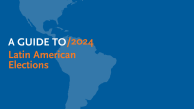AS/COA Insider: Randy Melzi on Old and New Political Forces in Panama's 2024 Elections
AS/COA Insider: Randy Melzi on Old and New Political Forces in Panama's 2024 Elections
“Mulino voters are hoping to go back to the time of Martinelli when there was a lot of economic growth and prosperity,” said the AS/COA vice president.
Just two days after a court confirmed his candidate eligibility, José Raúl Mulino won Panama’s May 5 presidential election with 34 percent of the vote—about 10 points higher than the runner-up in a crowded field of eight candidates. Mulino ran a campaign based on his ties with former president Ricardo Martinelli (2009-2014), who was the original candidate of his party before he was disqualified being convicted of money laundering.
“[It] will be interesting is to see how much influence Martinelli has in the government,” said AS/COA Vice President of Public Policy Programs and Corporate Relations Randy Melzi. She explains what to expect from a Mulino presidency, how his victory will affect U.S.-Panama relations, and why so many incumbents lost congressional election
- To speak with an expert on this topic, please contact: mediarelations@as-coa.org
- Hear Randy Melzi interview INDESA’s Felipe Chapman of about Panama’s macroeconomic panorama.
AS/COA covers 2024's elections in the Americas, from presidential to municipal votes.
As an unpredictable May 5 election nears, INDESA’s Felipe Chapman tells AS/COA’s Randy Melzi the next government faces a series of “fixable” problems.










